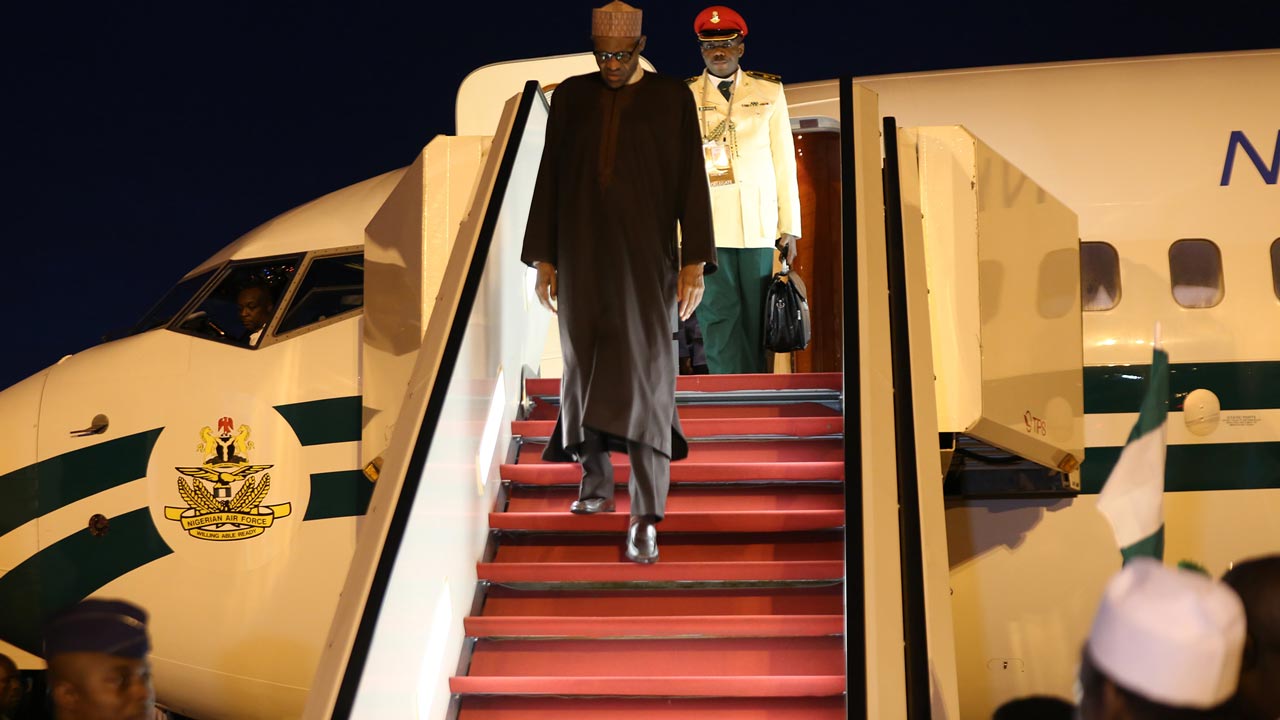- Jubilation in Abuja, Others as Buhari Returns After 104 Days
There was wild jubilation in Abuja, Katsina and other parts of the country on Saturday as President Muhammadu Buhari returned to the country from London, United Kingdom where he had been for medical treatment since May 7.
Security operatives had a hectic time controlling the crowd as the President’s long motorcade moved from the Presidential Wing of the Nnamdi Azikiwe International Airport, Abuja to the Presidential Villa.
Many residents of the Federal Capital Territory thronged the major roads from the airport to catch a glimpse of the President, who had spent 104 days outside Nigeria.
Some of them were singing, dancing with banners of the President’s portraits in hand, while others jostled to take photographs of the President’s convoy with their mobile phones.
The presidential aircraft that conveyed Buhari landed at the airport at 4.35pm to the excitement of all those present.
The aircraft then taxied to the tarmac amidst music played by the Guards Brigade along with a cultural troupe performing at the airport.
The President disembarked from the aircraft, NAF 001, at 4.48pm. He was received by top government officials led by Vice President Yemi Osinbajo.
Decked in a brown kaftan, Buhari mounted a rostrum and saluted the guard of honour.
He did not inspect the guard of honour before proceeding to acknowledge cheers from well-wishers and the dancers.
He, thereafter, got into his official car to be driven to the Presidential Villa.
The airport was at a standstill as workers made frantic efforts to get a glimpse of him.
Airport roads shut, travellers, commuters stranded
Hundreds of workers, travellers and other airport users were stranded at the airport following the closure of roads in the area.
Many travellers and other people at the airport were forced to wait, as security operatives cleared dignitaries who had come to welcome the President.
Despite the closure of roads and the delay of the travellers at the airport, many of them were excited to see the President back in the country.
On roads leading to the airport were hundreds of people singing and dancing, as they welcomed Buhari.
There were chants of “Sai baba!” as some youths performed some stunts with their vehicles and motorbikes.
Other groups of people displayed placards with messages like: “Welcome home, dear President”; “Sai Baba”; and “We love Buhari” as they struggled to catch a glimpse of the President.
There were other excited Nigerians who moved closer to the car the President was riding in, screaming, “Sai baba!” as they danced, following the slowly moving convoy of Buhari.
Earlier, there was commotion at the commercial wing of the NAIA as air passengers and workers rushed out in excitement to see Buhari immediately his aircraft touched down.
Those at the commercial terminals tried to push their way through to the tarmac but were stopped by security officials and personnel of the Federal Airports Authority.
“I would have loved to see at least his plane, because I know there’s no way I can see him from this departure terminal,” Okeke Benny, a Lagos-bound passenger said.
Daura residents jubilate
Residents of Daura – Buhari’s hometown – in Katsina State on Saturday evening suspended various activities they were engaged in to watch the President return to the country on television.
The residents who had waited patiently for the news of the arrival of the President, thereafter, began to dance as they sang to praise him.
In a carnival-like manner, some residents took to the streets in their vehicles and motorbikes;some drove around the town singing praises to God for bringing Buhari back to the country hale and hearty.
Business activities remained paralysed in major commercial areas, including Sabonline, Kofa-kaoran,Mani Road, Nagogo Road, and Ibrahim Babangida Way, in Katsina as many traders stayed glue to the TV.
Some youths were also seen in places like Rafindadi, Kofar Kwaya, Kofar Durbi and Kofar Sauri,also in Katsina singing Buhari’s praises and going from one place to the other.
A Daura resident, Shuaibu Haruna, said, “I am happy. At least, we shall all see our President and this will further shame those branding rumours around about him.”
Another resident, Hassan Dajuma, said, “You know, some people have cashed in on President Buhari’s absence to unnecessarily heat up the polity. Now, with his return, I foresee normalcy. I am happy for him; I am happy for our great country over his return.”
Speaking on Buhari’s return to the country, the Special Adviser to the President on Media and Publicity, Femi Adesina, told reporters at the airport that Buhari’s return had nothing to do with the #ReturnOrResign protests that took place in Nigeria and London.
Adesina said he and some presidential aides knew about his return some days back.
Adesina had earlier on Saturday issued a statement in which he announced that Buhari would return to the country later in the day and address Nigerians through a national broadcast on Monday.
The statement read, “President Buhari is expected to speak to Nigerians in a broadcast by 7 am on Monday, August 21, 2017. He thanks all Nigerians who have prayed ceaselessly for his recovery and well-being since the beginning of the health challenge.”




 Naira4 weeks ago
Naira4 weeks ago


 Naira3 weeks ago
Naira3 weeks ago


 News4 weeks ago
News4 weeks ago
 Travel4 weeks ago
Travel4 weeks ago




 Naira4 weeks ago
Naira4 weeks ago


 Jobs3 weeks ago
Jobs3 weeks ago
 Naira3 weeks ago
Naira3 weeks ago


 Travel3 weeks ago
Travel3 weeks ago



















